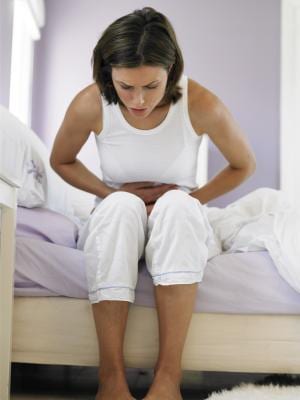If colon cleansing is part of your efforts to detox your body, there are certain side effects of which you should beware. Advertisements for colon cleansing supplements and kits dominate infomercials and Internet sites urging you to purge your body of dangerous “toxins.” But these product can contain certain ingredients — one of which is known to cause bloating, cramps and other symptoms of gastrointestinal distress.
Background and History
Colon cleansing has a riveting history; according to the American Heart Association, or AHA, the ancient Egyptians and Greeks believed in the theory of autointoxication. That is to say, that your bowels are veritable cesspools of poisons that accumulate due to the food that you eat, spreading throughout the rest of your body through your bloodstream. The theory of autointoxication remained prevalent until the early 1900s, when advances in medicine rendered it obsolete. Direct observation of the colon during surgery and autopsies disproved the notion that fecal waste built up in the intestinal walls.
What’s in a Cleanse?
Colon cleansing products, diets and programs can vary, depending on the method you choose. However, a colon cleansing kit typically contains fiber supplements, an herbal support supplement and a laxative tea, says Harvard Medical School. Sometimes an enema is employed as well. These cleansing programs are used on a daily basis for two to three months, or as long as the manufacturer recommends.
Side Effects
According to Mayo Clinic gastroenterologist Michael Picco, fiber supplements are generally used to make your stool soft so that constipation isn’t an issue. Bloating is a common side effect of taking fiber supplements — as well as gas and abdominal pain. Eating a lot of fiber-loaded foods, such as baked beans, cabbage, broccoli, cabbage, cauliflower, apples, peaches and pears, also has the same effect. But fiber supplements can also hinder your body’s ability to absorb the medications you take and decrease blood sugar levels. When taken without drinking plenty of water, fiber can actually cause you to become more constipated. Additional dangers associated with colon cleansing when combined with fasting detox diets include dehydration and electrolyte imbalance, cautions Harvard Medical School. A colon cleanse can even prevent your bowels from functioning normally.
Need to Cleanse?
So strong was ancient Egyptians’ fear of bowel waste, they ritually purged, using natural laxatives and enemas to hasten mother nature along. But a healthy colon functions quite well without the need for cleansing products, absorbing the nutrients you need and discarding waste you don’t. According to Harvard Medical School, there’s no scientific evidence to suggest that colon cleansing is beneficial for you in any way. Moreover, pictures you see in advertisements for colon cleansing products can be misleading, depicting long, serpentine fecal matter — likely the end result of consuming fiber in excess amounts.
Healthy Bowels
Contrary to what proponents of colon cleansing claim, you don’t need to have a bowel movement every day to be in good health. If you have fewer than three bowel movements a week and your stools are hard, dry and difficult to pass, you may suffer from a bout of constipation. Instead of trying a colon cleanse, MayoClinic.com suggests simply boosting the fiber in your diet, drinking lots of water and getting regular exercise. Talk to your doctor before using fiber supplements on a daily basis.





